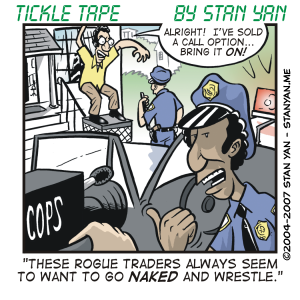“Old habits are hard to break.” “It’s hard to teach an old dog new tricks.” These sayings have a grain of truth to them. It’s often difficult to abandon old ways of doing things for new ones. The successful trader, however, must be able to keep what is working and discard what isn’t working. Why are old habits hard to break and how can we change them? Here are some suggestions.
Accurately self-monitor the behaviours you want to change. It’s often hard to identify behaviours that should be changed, but one cannot change a behaviour unless he or she identifies precisely what that behaviour is. Sometimes, however, we resist looking at our behaviours because we don’t want to admit how poorly we have been doing. Some traders are afraid to carefully look at win-loss ratios, for example, because they don’t want to admit they have been losing money.
But, we probably don’t fool ourselves as well as we think we do. When things are going against us, we secretly know it. Ironically, we probably also believe that we are doing more poorly than we really are. We are probably spending more effort and psychological energy denying the truth than looking at it objectively and taking specific action to remedy the situation. Self-examination can often be a relief, rather than a source of discomfort. We usually find that we are not doing as poorly as we had secretly envisioned, and when we look at ourselves objectively, we usually find that we can harness our resources and develop a creative solution.
Conquer Neophobia. People repeat behaviours when they are rewarded, and reduce behaviours when punished. But, sometimes the rewards are subtle and concern the avoidance of an unpleasant experience. Neophobia is the fear of new experiences. We associate our past experiences with safety while anticipating new experiences with fear and doubt. Animals instinctively fear new environments as a form of self-protection, and humans sometimes fall prey to this tendency.
For example, some traders believe they can only trade one market, but not another. Or, they may fear that new trading strategies may be too complicated to learn. These fears may be valid, but they are probably blown out of proportion. These fears prevent traders from learning new skills, which are vital for survival in ever-changing market conditions. Don’t let the fear of the new prevent you from learning how to trade in new markets or with new methods. Trade small positions if you need to, but get out there and try something new.
Practice alternatives. Once you have conquered your neophobia, it’s time to practice new alternatives. As you practice new methods, carefully monitor how well you are doing, and have realistic expectations. If your expectations are too high, you will tend to feel as if you are failing and punish yourself for trying. By holding realistic expectations, you will naturally reward yourself when making progress, and gain mastery through experience. It’s possible to learn something new if you set your mind to it. Try it, and you will see it’s worth the effort.

